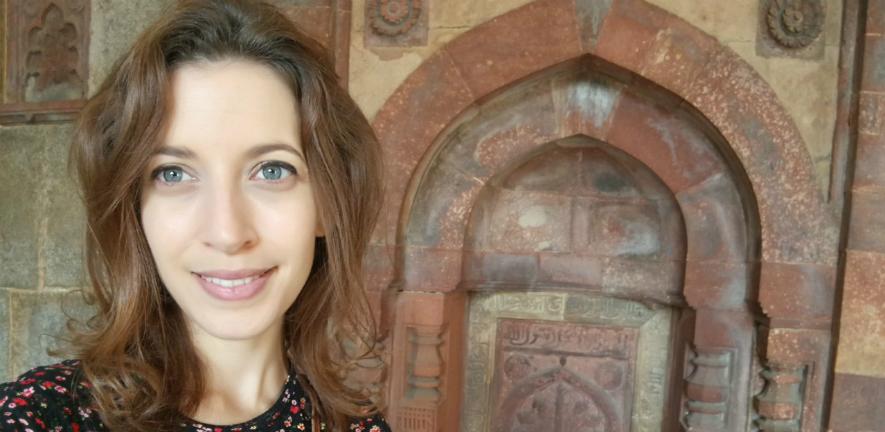
Submitted by Jane Durkin on Tue, 09/06/2020 - 13:30
Mélanie Gréaux is a PhD candidate at the Faculty of Education. She is co-supervised by Dr Jenny Gibson and Dr Napoleon Katsos, and funded by the ESRC-DTP Cambridge in partnership with Autistica. Her doctoral research is looking at the potential of collaborative and cross-cultural professional learning opportunities to foster inclusive healthcare services for autistic communities. Alongside her academic research, Mélanie is also involved in public engagement projects aimed at supporting children with Speech, Language and Communication disorders (RADLD) and multilingual families (CBN).
Mélanie will present her work on empowering Speech and Language Therapists to provide support for children with autism in linguistically and culturally diverse contexts at the Cambridge Language Sciences Symposium for Early-Career Researchers on 18 June 2020.
My research sets out to promote inclusive healthcare services for individuals at the intersection of communication disorders and linguistic and cultural diversity. More specifically, my doctoral project oversees the design and evaluation of a cross-cultural knowledge-exchange programme for Speech and Language Therapists supporting multilingual autistic children in India and the UK.
My research work is very varied, and balancing this with my public engagement work means no day is the same. Where possible, I try to follow what I like to call the ‘five finger rule’: (1) one writing task (e.g. a paragraph for my thesis, drafting a public engagement report or a blog piece), (2) some reading (usually a couple of articles or academic blogs), (3) a core PhD task (e.g. collaborating with my research informants, collecting data or analysing it), (4) a social & wellbeing activity (e.g. exercising or (e-)meeting with fellow PhD colleagues for coffee), and (5) bonus (because there’s always an unexpected assignment or urgent deadline to meet!). Following this semi-structure allows to keep my days varied and keeps me motivated in the long run.
Alongside the PhD, my public engagement work has given me a better appreciation of how research contributes to society beyond academia. RADLD (Raise Awareness of Developmental Language Disorder (DLD)) is an organisation that aims to increase awareness of DLD and disseminate evidence-based guidance to support individuals with DLD. In November 2019, I co-organised a half-day workshop for parents and teachers based on the RADLD campaign’s aims and resources. Engaging with passionate stakeholders and sharing evidence-based advice to support children with DLD was truly empowering. As an early career researcher, it can be easy to lose sight of the positive impact that your research can have on society. Public engagement allows me to keep it in mind, and further motivates me to do the best that I can during my research activities.
The most interesting day I’ve had so far was when I met with my non-academic research partner (Action for Autism) in New Delhi, India. I truly felt out of my comfort zone when I started this fieldwork. After all, before then, India was country and culture that I had then only ever ‘experienced’ through books, documentaries and friends. But, with the help and guidance of my local collaborators, I was a challenged to explore and expand the limits of my own understanding in a safe environment. Being exposed to different agendas, systems and organisations (UK and India) made for rich learning opportunities to facilitate a cross-cultural learning programme that would truly be beneficial and respectful to all parties. Most importantly, this collaboration made me realise that a small group of dedicated, resilient and passionate individuals can really make change happen.
Whilst in India, I also got a better appreciation for the complicated links between diversity and inclusivity, which are key concepts in my research. I was amazed by the rich diversity present in people and places – languages, clothes, colours, religions, food and so on. Yet there were also heated conflicts in Delhi between communities of different religious beliefs, somehow illustrating the inextricable tensions in any attempt to ‘include what is different’. This made me think in more depth about my project and the power dynamics between communities, institutions and practices, for example, how the prestige of languages influences language use.
Cambridge is a great place for developing new knowledge and skills. I feel supported to go beyond the boundaries of my research project and am very grateful for the fantastic academic, financial and pastoral support. I’ve met some wonderful people during my time here. Bringing together students and staff from all over the world united by a shared motivation to learn and innovate truly is one of the best things about being a researcher at Cambridge.
Social sciences do not have clear boundaries, which provides many opportunities to consider different perspectives and conduct multi-disciplinary research. It is very exciting to see links between your and others’ projects, even when you don’t think there is much of an overlap initially. For my PhD, I was inspired by researchers at the REAL Centre to incorporate fieldwork in India to my project, and encouraged by CEDiR’s researchers to include educational technology tools to support knowledge exchange between practitioners. Beyond the scope of my research project, I find it enriching to ponder broader applications and collaborations within and between the social sciences.
In the future I would love to be involved in impact research projects by national or international organisations around the development of inclusive services for children with disabilities. Being involved in policymaking and PPI (Patients & Public Involvement) is also a path that I am considering as it bridges critical gaps between research and societal issues. Finally, I’m also open to more clinically oriented projects where I could build up my own competencies as a speech and language therapist, and support that of other clinicians. These are all avenues I’m keen to pursue but, as this COVID-19 crisis has taught us, it is important to adapt to circumstances. Therefore, I’m keeping an open mind and very much look forward to seeing what the future holds for me.
